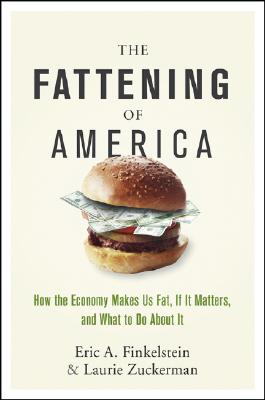If you are like me, you've probably already begun to fatten up for the winter. In fact, it is not uncommon for adults to gain 5 pounds or more between Thanksgiving and New Years. It is no wonder that American's most common New Year's resolution is to lose weight. With any luck, we can drop those extra pounds and be ready to go by next Thanksgiving. However, the reality is that most of us will fail in our efforts to lose the weight. Evidence suggests that 95% of those who lose weight fail to keep it off for at least two years. As a result, and as you've undoubtedly seen in countless news stories, Americans have a weight problem. Currently, two thirds of U.S. adults are above the normal weight range, making normal anything but.
So as Americans cascade out of the government's normal weight range, does this mean that it's time for government to step in and take measures to encourage citizens to do what we are incapable of doing ourselves and reverse the obesity trend?
Government isn't about to ban Thanksgiving, but in fact, policymakers at the state and federal level are increasingly proposing new legislation aimed at lowering obesity rates in America. At the federal level, these include such recently introduced bills as the Healthy Foods for Healthy Living Act, the Medicaid Obesity Treatment Act, and the Commonsense Consumption Act.
Many critics say that government, by trying to influence the weight of the population, is overstepping its bounds and trespassing on the rights of citizen's. What is becoming less compelling is the counter-argument that these intrusions are warranted on the grounds that they improve public health.
If you are substantially overweight, then weight loss would almost certainly do you some good. However, for those of us who are only slightly overweight, say 30 pounds or less, the evidence is less than compelling.
What evidence am I talking about? Evidence presented, in fact, by the federal government. A recent study by researchers with the Centers for Disease Control and Prevention reveals that mortality rates among those who are only moderately overweight are actually lower for noncancer, and non-Cardiovascular (CVD) causes that for those who are "normal" weight and not statistically different for cancer or CVD. A second study shows that today's obese population has lower cholesterol and blood pressure values than normal weight adults did 25 years ago.
So why then is government increasingly anxious for us to shed some pounds? It is not so we'll look better at the annual X-mas party or because weight loss will boost our self esteem and make us more attractive to the opposite sex. Although these might well be valid reasons for us, government has an ulterior motivation.
Whereas the health benefits of weight loss among the moderately overweight is debatable, there is no question that excess weight is taking a financial toll on businesses, insurers and you guessed it, on government. Although we might not be dying off early due to our excess weight, and our cardiovascular profile isn't looking so bad, the underlying reason is that we are increasingly counting on the health care system to take the place of what a healthy diet and physical activity used to do.
For example, of the top 25 most prescribed drugs on the market today, 10 of them target hypertension, high cholesterol, and diabetes, three diseases clearly promoted by excess weight. In addition, last year alone there were over 1.5 million medical procedures performed in the U.S. aimed at opening clogged arteries, another common problem among the weight challenged. The drugs and procedures are having the intended effect, but at a significant cost.
I published a paper several years back showing that overweight and obesity are responsible for about 9% of all medical expenditures in the U.S., or about $90B per year. Moreover, thanks to the Medicare and Medicaid program, half of this total is paid by us, the taxpayers. As a result, Each taxpayer finances about $180/yr for obesity-related medical costs in these programs. Indeed, these costs may be the government's primary motivation to get us to drop the donuts, strap on the gym shoes, and shed some pounds.
However, I want to point out one key fact that rarely makes its way into the obesity policy debate. Any effort by government to encourage people to lose weight, unless it saves more money than it costs, will only raise our taxes even more, regardless of whether or not it is effective at getting people to lose weight. Unfortunately, cost-saving obesity interventions have yet to be identified. So until they do, obesity may be taking two significant bites out of the government coffers.
Food for thought as we eat our way into the New Year.
